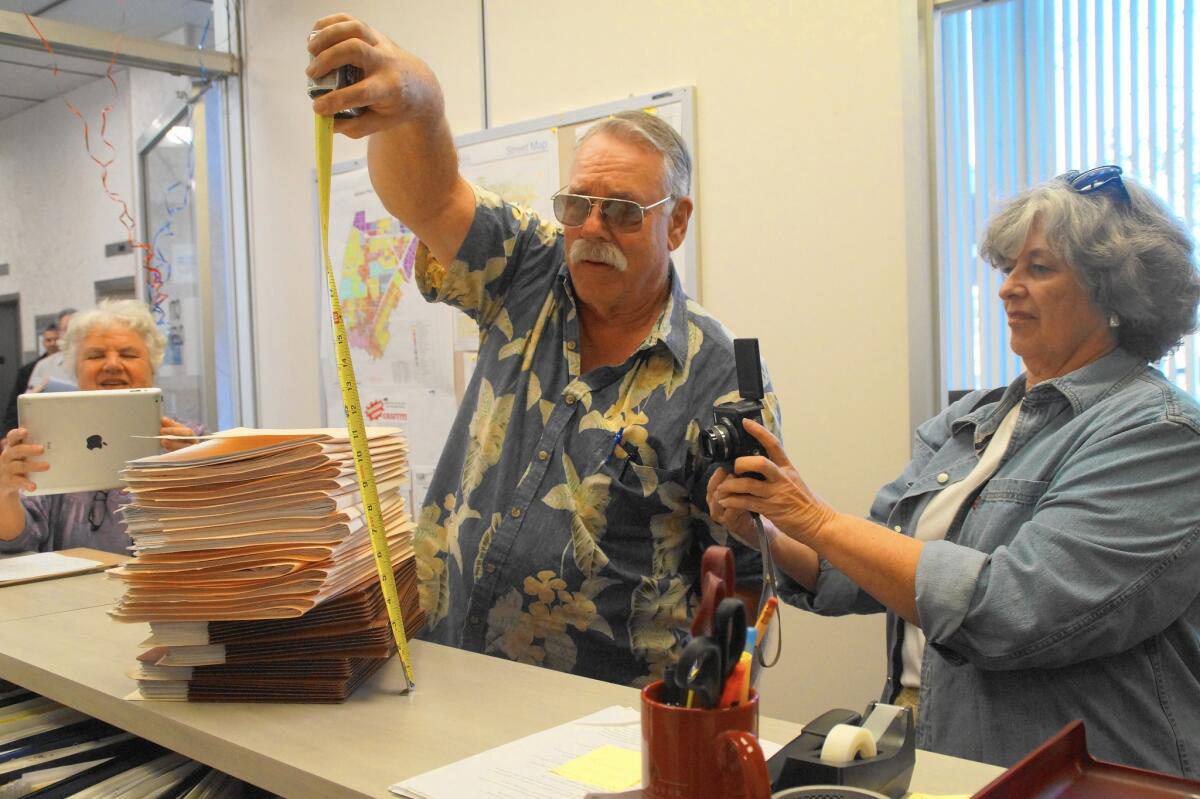6,900 petition signatures turned in for ballot initiative requiring voters’ OK of ‘major’ developments

Jay Humphrey of Costa Mesa First measures the height of petition paperwork that he and others presented to the Costa Mesa city clerk’s office on Jan. 4 as Mary Spadoni, left, and Sally Humphrey take photos.
- Share via
Once he had finished stacking folder after folder of voter signatures in the Costa Mesa city clerk’s office Monday afternoon, Jay Humphrey brought out measuring tape to see how high a pile he had.
“That is 10 inches of paper,” he said.
Humphrey then quickly corrected himself: “No, it’s 11.”
Behind him, star-shaped balloons imprinted with the American flag floated toward the ceiling. Supporters had brought them along to signify the moment when City Hall received thousands of signatures favoring a proposed ballot initiative that, if approved in November, would require direct voter approval for new “major” developments instead of just the City Council’s OK.
Humphrey, a former councilman, was one of the organizers of the petition created by Costa Mesa First. The political action committee has been gathering signatures from registered voters since July.
The signatures next go to the Orange County registrar of voters office for verification. The city clerk’s office submitted to the registrar 6,908 of the 6,916 signatures Costa Mesa First turned in — almost 2,000 more than the 4,995 verified ones needed to qualify the initiative for the Nov. 8 general election ballot.
Costa Mesa First’s 11-page proposed law purports to “give the people of Costa Mesa control of their future” by providing them direct influence on new developments that would both require changes to the city’s zoning code or general plan and meet at least one of a host of other requirements, including containing 40 or more residential units, adding 10,000 square feet or more of commercial space or generating more than 200 average daily vehicle trips.
Costa Mesa First’s petition took inspiration from others in Newport Beach, Malibu, Redondo Beach and other cities.
“This is going to make sure the people who develop in Costa Mesa will live by the rules we have set in the city,” Humphrey said. “They will make choices and do things that will be most productive to the city of Costa Mesa.”
Mary Spadoni, an organizer of Costa Mesa First, said most of the signatures were acquired in the past six weeks.
“We just had so much support from Mesa Verde, Eastside, Westside — it was just like all of a sudden it caught fire,” she said. “This was grass roots. There was no money involved in this. Everything that was done was done by residents, volunteers.”
Opponents of Costa Mesa First’s proposal have labeled it an example of “ballot box voting,” arguing that it would stifle growth and deter businesses from expanding their operations in town or moving there because they don’t want to face an election battle to do so.
“It’s bad for public safety,” said Mayor Steve Mensinger. “It’s bad for business. It’s bad for families and it’s bad for those who believe in property rights.”
Mayor Pro Tem Jim Righeimer said the city’s ongoing effort to revitalize motels with new residential development also would take a hit if Costa Mesa First’s proposal becomes law.
He pointed to the Costa Mesa Motor Inn project, which the council approved last year. That project involves demolishing the 1960s-era Harbor Boulevard motel and replacing it with apartments. The property has long been an eyesore and a source of criminal activity, Righeimer said, and if Costa Mesa First’s law were in place now, replacing it would require voter approval and an election battle that developers aren’t eager to fight. It’s possible the project wouldn’t have been proposed at all, he added.
“A vote for this is a vote for us to keep the pimps, prostitutes and all the bad things we have,” Righeimer said. “Overall, for the city that’s going to be bad. We’re gonna have old, dilapidated, crime-ridden properties that we’re never going to get rid of.”
Humphrey said Costa Mesa First is preparing should its proposal be challenged in court.
“Anybody can sue for any reason,” he said. “And if there is any legal backlash, we’ll take those steps as necessary.”
